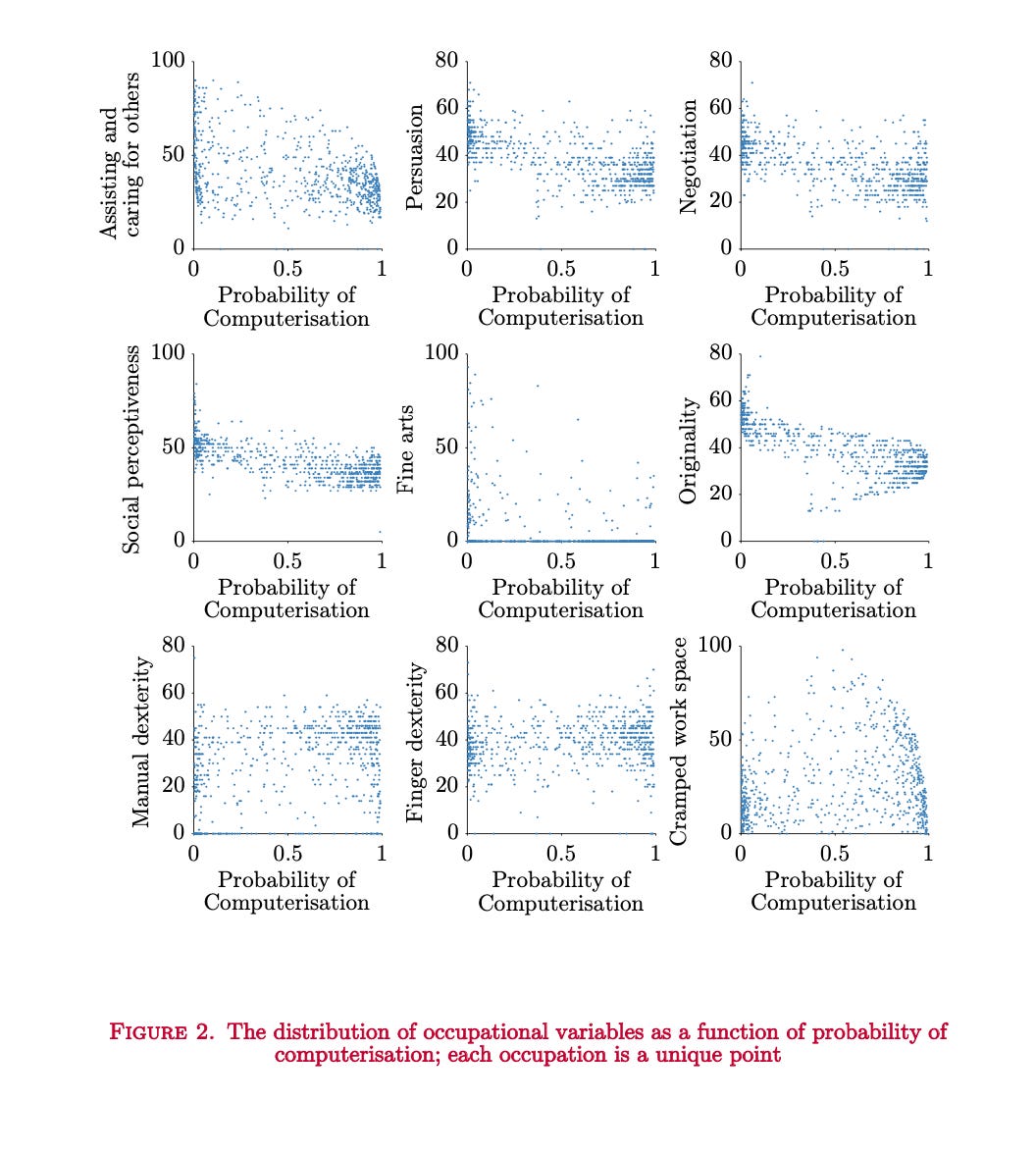
Salam all!
Good decision makers are good futurists, and good futurist thinking is laden with clarity.
Clarity is a result of asking good questions.
For example: what factors, exactly, make a job prone to automation?
I know this is a saturated topic, but I wanted to look at the factors that determined jobs at risk, and how relevant are they today — especially after the amazing developments in Natural Language Processing (NLP) models.
Keynes (prominent economist) predicted that most jobs will be automated “due to our discovery of means of economizing the use of labour outrunning the pace at which we can find new uses for labour” (Keynes, 1933, p. 3).
Today I share my summary of a highly cited research paper from 2016. [1]
The future of employment: How susceptible are jobs to computerisation?
Two Oxford researchers take a good look on matching recent tech developments with job automatability.
I will skim over their results, as I am most interested in their methodology.
Their question
How susceptible are current jobs to recent tech developments?
Why do they ask it?
Long time ago, automation targeted rule-based routine jobs (i.e. jobs that can be mapped to business rules). Now the case is different: tech can solve complex tasks.
Tech is evolving so quickly. In 2004, a paper titled 'Why Humans Still Matter’ argued that we still need humans — e.g. a car driver needs complex perception skills to navigate a simple left-turn. Six years later, Google announced it had modified Toyota Priuses to be fully autonomous.
(I am skipping summarizing Sections 2 & 3 as they talk in-depth about the history and present of technological developments, and of computer task models)
So, how do they answer it?
They’re measuring two things to answer the question:
Probability of job automation from Machine Learning (ML) and Robotics (MR)
Ideally, they would have tested their hypothesis on two identical autarkic (independent) economies. One has accessible automation (e.g. talent, tech resources), the other one not. Because this isn’t feasible, they model demand for workplace tasks against developments in tech.
They take 702 occupations with their detailed properties (O*NET database). They picked 9 skills/variables that they’re interested in (Table 1.)
They identify technical tasks (‘computerization bottlenecks’) and mapped them to these 9 variables.
They assign an ‘automatable’ score based on a combo of subjective and objective measures.
They trained a model on some of the data they manually labeled with confidence. The model told them which features (variables) had the highest automation score.
They ran it on the rest of the dataset to get a number next to each occupation.
Their method has more decisions on how the model classified the rest of the data points. You can see their results in Figure 2.


Expected future impact on labor market outcomes
They mapped the occupations to the composition of the US labor market to get a number on impacted jobs.

What did they find?
Transport, logistics, office & admisitration support and production occupations are at risk
Surprisingly: Large share of service sector occupations are highly susceptible to automation
Level of education needed per occupation is negatively correlated with possibility of automation (intuitive)
What do they recommend?
For low-skill / low-wage occupations: acquire creative/social skills
But,
They don’t account for regulations and political activism
They don’t account for factors relating to profitability (of automation)
They only take 9 variables in their scoring scheme — the original dataset considers 35 skills. What about considering tech advancements on automating problem solving tasks, like programming and quality assurance.
My conclusion:
I have seen no gap in the properties determining risky jobs.
But my observation is that there has been colossal improvements in ML after this paper was published (3.5 years ago!). Machine learning has had a greater capacity for creative output and problem solving/pattern matching, this made it possible to generate code from writing.
No body expected programmers could be rendered automatable this soon! (this is a partially false statement. We are leagues away from automating programmers. Or are we?)
If you are curious about companies championing automation, here’s one: Automation Anywhere. Also, watch out for OpenAI’s aggressive API program for developing products. I think their cutting-edge models will change the landscape of startups.
I’m happy to hear your thoughts
How will your occupation be impacted by automation?
Write your thoughts back to me, and I will share my own on how your occupation can/would be automated (i.e. what areas of AI research are targeting it). I personally think that one day every task done by humans — no matter the complexity — can be automated.
[1] Frey, Carl Benedikt, and Michael A. Osborne. "The future of employment: How susceptible are jobs to computerisation?." Technological forecasting and social change 114 (2017): 254-280.


